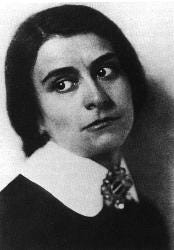Else Lasker-Schüler’s Wild Rise as a Modern Performing Poet
It all began with a party in Berlin....
This post is adapted from a chapter of my unpublished nonfiction, “The Will to Style: Radical Utopians of the Weimar Bauhaus, 1919-1925.” -ts
BERLIN (23. December, 2024) — The story of performance artist Else Lasker-Schüler (1869-1945) begins, as some things do, with a party in Berlin.
Eager to mingle among people who were more “chic” and “elegant” than not, the 20-something Lasker-Schüler became determined to crash this particular nighttime event and implored her most willing friends to dress accordingly.
Having so agreed, Else’s pals donned their own “fancy” clothes for that night’s meet-up and invasion of a party by “the better crowd.” The group was surprised, however — and more than a little shocked — to see Lasker-Schüler arrive in a long red Russian blouse, a strange plaid scarf and, upon her head, a Turkish fez. Further scandalizing her pals, the young woman also carried a small-but-still-indelicate overnight case.
“I’m traveling exotic,” she explained.
At first, they didn’t buy it. Aghast, one girlfriend almost refused to go out with her, but Else became extra-convincing. Promising they’d have fun, she told her friends of her plan to abandon German as her mother-tongue. For tonight, the diminutive and mannish Else Lasker-Schüler would become a member of visiting “Oriental” royalty. Specifically, she would be introduced to party-goers that night as “Jussuf, Prince of Thebes.” The prince, of course, spoke no German but was, instead, “fluent” in a language completely of Lasker-Schüler’s own making.
At this notable event in Berlin performance-art history, Else Lasker-Schüler created her own “foreign prince,” the first member of what became a skene of characters, all hailing from from a distant, imagined land, somewhere near the Mediterranean or the Middle East — a place understood to be “Oriental;” a place so completely “lost,” no single bit of story-telling nor legend, nor actual historical account could quite capture it — and certainly not in the way that Else Lasker-Schüler did.
In creating her Prince Yussuf and other literary characters, Lasker-Schüler effectively disguised the fact that she’d actually been raised by well-off parents in Wuppertal, in the North Rhine-Westphalia, with German as the only language she ever really knew.





